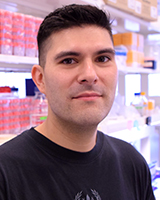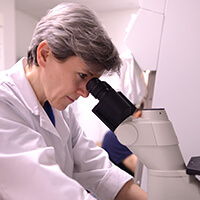 M. Andrés Blanco
M. Andrés Blanco, an assistant professor at the University of Pennsylvania School of Veterinary Medicine.
and his colleagues have identified a new approach to triggering differentiation in AML—one with potential to treat a much wider array of AML patients.
Their study, published in the journal Cancer Discovery, identifies an enzyme that regulates the process by which AML cells differentiate. In both cell lines and an animal model, the researchers found that inhibiting this enzyme, particularly in combination with other anti-cancer therapies, prompted AML cells to lose aspects of their identity associated with aggressive growth. The cells also began to exit the cell cycle, on the path toward maturing into a new cell type.
Read the rest of the story...

For dogs with osteosarcoma, a cancer of the bone, the standard treatment has been amputation combined with chemotherapy, and even that rarely staves off the cancer’s spread.
Dr. Nicola Mason is embarking on a new way to treat the disease, using a novel immunotherapy-based vaccine to prevent metastasis to other organs.
Read about Dr. Mason's clinical trial for canine cancer patients ...